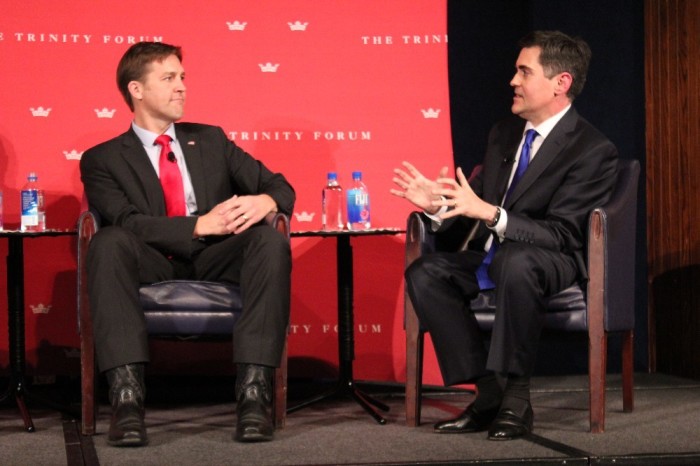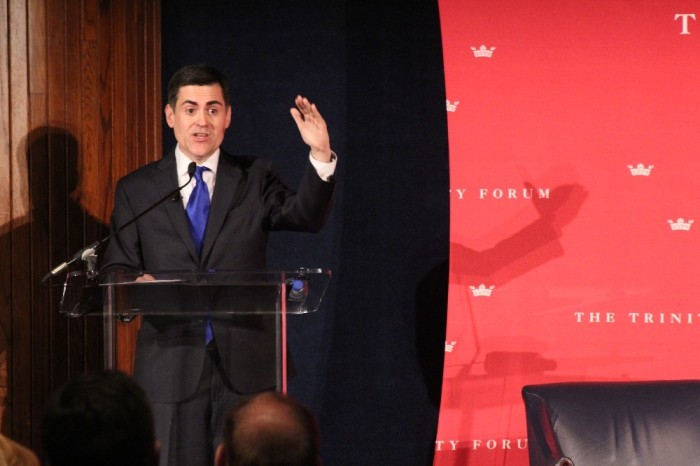'We in American Christianity are in danger of losing our own mission,' Russell Moore argues

WASHINGTON — Leading Southern Baptist ethicist Russell Moore argued Monday that Christians in America are “in danger” of “losing our mission” during a discussion with Republican Nebraska Sen. Ben Sasse.
The head of the Southern Baptist Convention's Ethics & Religious Liberty Commission joined the junior Nebraska senator for a conversation on topics ranging from America’s loneliness epidemic and political tribalism to reconciliation and technology’s impact on the future of the United States at the National Press Club.
The conversation — titled “The Lonely American: Rootedness and Reconciliation in a Riven Land” — was hosted by The Trinity Forum, an evangelical nonprofit that regularly convenes “leading thinkers and thought leaders to consider and discuss life’s great questions in the context of faith.”
Being the keynote speaker, Sasse gave about a 25-minute speech in which he said that the “political tribalism” seen in the U.S. today is merely a “symptom” of the digital revolution in which people have more “material abundance” than ever before but are feeling more “spiritually impoverished” and more lonely than at any point in his lifetime.
Along with the digital revolution, the 46-year-old senator said a media environment has been fostered to where Americans have lost their “sense of we.”
“That is strange. It isn’t the case that there used to be a big, coherent, America national ‘we’ that didn’t have scars and blemishes and problems,” Sasse explained. “It was that you had local communities, and distant communities served a distant and lesser purpose. Because they were in a box of what happened far away, you could have your local community and your distant community, and your distant community wouldn’t be the thing that you tried to impose all sorts of grand meaning.”
“Because of the digital revolution and the hollowing out of the local community and the evaporation of place in a lot of ways, we are projecting things onto a distant national identity of 300 million people but we aren’t really sure what the ‘we’ is that we share and have in common,” Sasse added.
Tasked with responding to Sasse’s remarks, the 47-year-old Moore highlighted what he thinks the American Church has to offer when it comes to “this sort of rootless, lonely American life.”
“What I would suggest is the things the Church has to offer are actually the things that are the most offensive at the surface level to the outside culture,” Moore explained. “The first thing is the exclusivity of truth.”
Moore noted, however, that there are several common objections that people who are not Christians have toward the Church, such as their objections with biblical truths that might run counter the cultural agenda.
“What I would suggest is that we are living in a time, which as Marilynne Robinson puts it: ‘a society that is moving toward the dangerous ground when loyalty to the truth is seen as disloyalty to the tribe,” Moore said.
While Moore explained that people who are not Christians don’t have to agree with the Bible or the Christian worldview, he said that the primary objection that the outside world has with the Church is not that it is too “dogmatic” in its beliefs but rather that Christians “do not actually believe what we say we believe.”
“Look at the devastation that is coming with the [sexual abuse] revelations out of Pittsburgh and the Catholic Church,” he explained. “Look at the devastation that comes with some of the cartoonish and buffoonish behavior that will often take place in evangelical life. Does the Church have the ability to speak to the moral imagination that says, ‘You don’t have to agree with us but you can be confident that when we are speaking it is not in service to some other agenda — political, social, market-based — but actually because we are, as Jesus puts it, bearing witness to the truth.'”
Even though Jesus calls on Christians to love their neighbors, refugees and the most marginalized members of society, a recently released poll found that white evangelicals are the only religious demographic to have a majority that view “immigrants” as a threat to the country and the nation’s increasing racial diversity as harmful.
While some notable conservative evangelicals have issued inflammatory remarks in the past that some say demonize Muslims and immigrants, Moore said that a recent Cato Institute study had shown that “evangelical Christians who go to church more often actually have more positive views toward their Muslim neighbors, toward refugees and immigrants, toward people of other ethnicities and races.”

“Such does not surprise me at all,” Moore said. “It is that churches that are the most actively evangelistic are also the ones who most are connected with their neighbors, most love their neighbors.”
“If you find a congregation that is working with Muslim refugees, sharing the Gospel, those are going to be the Christians who will say, ‘You will not scream at our neighbors,’” Moore continued. “We believe they are created in the image of God and we believe they are loved by God and we are going to stand with them. Also, that understanding of faith sees Christian in a very different way than the alt-right does, for instance, which sees Christian as simply another word for western civilization, white identity, European roots, fill in the blank.”
Moore also asserted that people who actually believe the devil exists “are less likely to make devils out of other people” or their neighbors.
“Having an understanding of demons ought to lead the Church not to demonize other people,” he explained. “The Church ought to be the one to say that Mephistopheles is not the presence in front of you who disagrees with you. The devil is usually subtle within your very midst, offering you pleasure and power. We ought to be the ones that understand that and are able to see that.”
Along with the idea of welcoming the neighbor, Moore contended that churches need to ”justify their own existence” through the “bustle of business” within their congregations in an era where “exhaustion” and inactivity have become a new normal for many tired Americans.
“It seems to me that we are living in a time when there is exhaustion of being active around us, a time when quietness and a kind of liturgy and a kind of disconnection from the whirl and velocity of the outside world is necessary,” Moore said. “It is also true that as we in American Christianity are looking at the outside world, we recognize that we are in danger of losing our own mission.”
Moore explained that many people today choose their churches on the basis of the activity and missions that go on at those congregations.
“I have said for years, one can usually tell the difference between a church that is booming and a Church that is old and maybe past its prime on the basis of whether or not there is a church graveyard,” Moore said. “They don’t build church graveyards at megachurches. Seeker-friendly congregations usually do not think about church graveyards. They think about coffee kiosks. … The idea is that we don’t want to be associated with death and inactivity. We want to be associated with philosophy and activity. There used to be signs that said ‘A Church Alive is Worth the Drive.’”
In following up on Sasse’s theme of the “sense of we,” Moore said that American Christians need to be sure that they hold on to a more “pre-eminent” sense of we.
“[W]e also need to understand that behind that ‘we,’ there has to be a more pre-eminent ‘we’ that is [more than] a nation — E Pluribus Unum. It's a nation under God, a group of people who have loyalties to something that is more than a nation itself,” Moore said. “With that happening, I think we can then bridge the gap between who we are from who they are. That requires remembering who we are in the first place. Only then, I think, can we say to rootless, exhausted, tired, lonely Americans, in the words of Jesus, ‘Come to me all you who are weary and heavy laden and I will give you rest.’ Only then can we learn to sing to ourselves, ‘Jesus loves them this I know for the Bible tells me so.’”



























